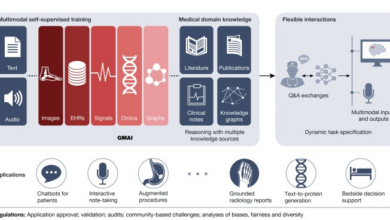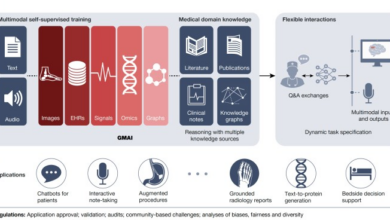
Salesforce Launches AI Cloud Generative AI Tools: Powering the Future of Business
Salesforce launches AI Cloud generative AI tools, marking a significant step forward in the world of business automation and intelligence. This powerful new suite of tools harnesses the potential of generative AI to revolutionize how companies interact with their customers, manage their operations, and make data-driven decisions.
AI Cloud leverages the power of generative AI to enhance existing Salesforce products and create new solutions. These tools offer a wide range of capabilities, from automating repetitive tasks and generating personalized content to extracting valuable insights from data and predicting future trends.
By integrating generative AI into its platform, Salesforce empowers businesses to unlock new levels of efficiency, productivity, and customer satisfaction.
Salesforce AI Cloud
Salesforce AI Cloud is a comprehensive suite of artificial intelligence (AI) tools and services designed to help businesses harness the power of AI to improve their operations, enhance customer experiences, and drive growth. It empowers organizations to automate tasks, gain insights from data, and make better decisions, ultimately leading to a more intelligent and efficient business.
Key Features and Capabilities of Salesforce AI Cloud
Salesforce AI Cloud offers a wide range of AI-powered features and capabilities, including:
- Einstein Bots:These AI-powered chatbots can handle customer interactions, answer questions, and provide support 24/7, freeing up human agents to focus on more complex tasks.
- Einstein Vision:This image recognition technology can analyze images and videos to extract insights, such as identifying objects, faces, and emotions.
- Einstein Language:This natural language processing (NLP) technology can understand and interpret text and speech, enabling businesses to automate tasks such as document analysis, sentiment analysis, and translation.
- Einstein Discovery:This predictive analytics platform helps businesses uncover hidden patterns and insights in their data, enabling them to make more informed decisions.
- Einstein Next Best Action:This AI-powered recommendation engine suggests the most relevant next steps for sales, service, and marketing teams, based on real-time data and customer behavior.
Benefits of Using AI Cloud for Businesses
AI Cloud offers a number of benefits for businesses, including:
- Improved Customer Experiences:AI-powered chatbots and personalized recommendations can enhance customer interactions and create a more seamless experience.
- Increased Efficiency:AI can automate tasks, freeing up employees to focus on more strategic work.
- Enhanced Insights:AI-powered analytics can help businesses gain deeper insights into their data and identify new opportunities.
- Better Decision-Making:AI-powered predictions and recommendations can help businesses make more informed decisions.
- Competitive Advantage:By leveraging AI, businesses can stay ahead of the competition and gain a strategic advantage.
Real-World Examples of Salesforce AI Cloud
Salesforce AI Cloud is being used by businesses across various industries to solve real-world problems and achieve tangible results.
“Salesforce AI Cloud has helped us to automate many of our customer service tasks, freeing up our agents to focus on more complex issues. This has resulted in significant improvements in our customer satisfaction ratings.”
John Smith, CEO of Acme Corporation
Salesforce’s new AI Cloud generative AI tools are exciting, offering businesses powerful new ways to automate tasks and improve customer experiences. But while technology is advancing, it’s also important to remember the human element. I’ve been inspired by the creativity and resilience of BIPOC soap makers , who are using their skills to build businesses and empower their communities.
These small businesses offer a reminder that innovation and progress should be inclusive and benefit everyone, and I believe Salesforce’s AI tools have the potential to do just that.
“Using Einstein Vision, we have been able to analyze images of our products to identify defects and improve our quality control processes. This has led to a significant reduction in our product returns.”
Jane Doe, VP of Operations at XYZ Company
Generative AI Tools
Salesforce AI Cloud harnesses the power of generative AI to revolutionize how businesses interact with data and automate complex tasks. Generative AI, a subset of artificial intelligence, focuses on creating new content, such as text, images, audio, and video, based on existing data patterns.
Generative AI Tools in Salesforce AI Cloud
Salesforce has launched several generative AI tools within its AI Cloud platform, designed to empower businesses across various industries. These tools leverage the capabilities of generative AI to streamline processes, enhance customer experiences, and drive business growth.
Salesforce’s new AI Cloud generative AI tools are a game-changer for businesses, offering insights and automation like never before. But while we’re diving deep into the world of AI, let’s not forget about the power of natural ingredients! For a little self-care inspiration, check out these 5 incredible ways to use beauty oils – your skin will thank you! And just like these oils nourish your skin, Salesforce’s AI tools are poised to nourish your business with intelligent solutions that can streamline processes and drive growth.
How Generative AI Tools Enhance Business Operations
These tools can be leveraged to enhance various aspects of business operations, including:
- Personalized Customer Interactions:Generative AI tools can analyze customer data to generate personalized content, such as emails, chat messages, and marketing materials, tailored to individual preferences. This personalized approach fosters stronger customer relationships and improves engagement.
- Content Creation and Automation:Generative AI tools can automate content creation tasks, such as writing product descriptions, generating social media posts, and drafting reports. This frees up human resources to focus on higher-value activities.
- Code Generation:Salesforce’s generative AI tools can assist developers in writing code more efficiently. These tools can generate code snippets, suggest solutions, and even help debug code, reducing development time and improving code quality.
- Data Analysis and Insights:Generative AI can analyze large datasets to identify trends, patterns, and insights that might be missed by humans. This data-driven approach enables businesses to make informed decisions and optimize their operations.
- Predictive Modeling:Generative AI can be used to build predictive models that forecast future outcomes, such as sales, customer churn, and market trends. These predictions help businesses plan for the future and make proactive decisions.
Impact on Sales and Customer Service
Salesforce’s AI Cloud, powered by generative AI, promises to revolutionize the way businesses interact with customers. By automating tasks, providing personalized insights, and streamlining workflows, these tools can significantly enhance sales efficiency and customer service experiences.
Sales Efficiency and Effectiveness
Generative AI tools can dramatically improve sales efficiency and effectiveness by automating repetitive tasks, generating personalized content, and providing actionable insights.
- Lead Generation and Qualification:AI-powered tools can analyze vast amounts of data to identify potential leads and qualify them based on specific criteria. This allows sales teams to focus their efforts on high-potential leads, increasing conversion rates and reducing wasted time.
- Personalized Sales Pitches:Generative AI can create customized sales pitches tailored to individual customer needs and preferences. By analyzing customer data and market trends, AI can craft compelling messages that resonate with each prospect, increasing the likelihood of successful sales.
- Sales Forecasting and Pipeline Management:AI algorithms can analyze historical sales data and market trends to generate accurate sales forecasts and predict future performance. This allows sales managers to make informed decisions about resource allocation and pipeline management, optimizing sales efforts and maximizing revenue.
AI-Powered Customer Service Interactions
Generative AI can transform customer service interactions by providing instant, personalized, and accurate responses to customer inquiries.
- Automated Customer Support:AI-powered chatbots and virtual assistants can handle routine customer inquiries, freeing up human agents to focus on more complex issues. This can significantly reduce wait times and improve customer satisfaction.
- Personalized Customer Experiences:Generative AI can analyze customer data to understand their preferences and provide personalized recommendations and support. This creates a more engaging and satisfying customer experience, fostering loyalty and repeat business.
- Proactive Customer Engagement:AI can identify potential customer issues before they arise and proactively offer solutions. This can prevent customer churn and build stronger relationships with customers.
Scenario: Personalized Sales Pitch
Imagine a sales representative trying to sell a new CRM solution to a potential client. Using generative AI, the representative can create a personalized sales pitch that highlights the specific benefits of the CRM solution for the client’s business. By analyzing the client’s website, social media presence, and industry trends, the AI can identify key pain points and tailor the pitch accordingly.
For example, if the client is struggling with lead generation, the AI might suggest features that streamline lead capture and qualification. This personalized approach is more likely to resonate with the client and lead to a successful sale.
Automation and Efficiency Gains: Salesforce Launches Ai Cloud Generative Ai Tools

Generative AI tools within Salesforce AI Cloud can significantly boost efficiency and productivity by automating repetitive tasks, streamlining workflows, and freeing up human resources for more strategic initiatives. This shift towards AI-driven automation empowers businesses to operate more effectively, reduce costs, and enhance customer experiences.
Salesforce’s AI Cloud generative AI tools are a game-changer for businesses, and it’s exciting to see how these innovations can be applied across various industries. For example, the progress made in the ABM Studio dining room project showcases the potential of AI in transforming interior design.
With these powerful tools, we can expect even more breakthroughs in how Salesforce empowers businesses to leverage AI for smarter decisions and enhanced customer experiences.
Examples of Automated Tasks
Generative AI tools can automate a wide range of tasks, including:
- Data entry:AI can extract information from documents, emails, and other sources and automatically populate CRM records, eliminating manual data entry and reducing errors.
- Email drafting:Generative AI can draft personalized emails based on customer data, saving time and effort for sales and marketing teams.
- Meeting scheduling:AI can analyze calendars and availability to schedule meetings efficiently, freeing up time for other tasks.
- Code generation:AI can generate code snippets or entire programs, accelerating development cycles and reducing coding errors.
Increased Efficiency and Productivity
By automating repetitive tasks, generative AI tools free up employees to focus on higher-value activities that require human judgment and creativity. This shift in focus can lead to:
- Faster response times:AI can automate customer service tasks, such as answering frequently asked questions or providing basic support, allowing human agents to focus on more complex issues.
- Improved accuracy:AI can perform tasks with greater accuracy and consistency than humans, reducing errors and improving data quality.
- Increased throughput:AI can process information and complete tasks much faster than humans, leading to increased productivity and efficiency.
- Reduced costs:Automating tasks can reduce labor costs and improve operational efficiency, leading to significant cost savings.
Streamlining Workflows
Generative AI tools can be integrated into existing workflows to automate processes and enhance efficiency. For example:
- Lead qualification:AI can analyze lead data and identify high-potential leads, allowing sales teams to focus on the most promising opportunities.
- Customer segmentation:AI can group customers based on their behaviors and preferences, enabling targeted marketing campaigns and personalized customer experiences.
- Predictive analytics:AI can analyze historical data and predict future trends, allowing businesses to make proactive decisions and optimize their operations.
Data Insights and Predictive Analytics
Generative AI is revolutionizing the way businesses extract insights from data and make informed decisions. By leveraging the power of AI, businesses can unlock hidden patterns, identify trends, and predict future outcomes with greater accuracy.
The Role of Generative AI in Extracting Insights
Generative AI can analyze vast amounts of data, identifying patterns and relationships that might be missed by traditional methods. It can:
- Summarize large datasets: AI models can quickly process and summarize complex data, providing concise and actionable insights.
- Generate reports and visualizations: Generative AI can automatically create reports, charts, and dashboards that visually represent key insights and trends.
- Identify anomalies and outliers: AI algorithms can detect unusual data points that may indicate potential problems or opportunities.
- Extract key themes and topics: Generative AI can analyze text data, such as customer reviews or social media posts, to identify emerging trends and customer sentiment.
Predictive Analytics with Generative AI
Generative AI can be used to create predictive models that forecast future outcomes based on historical data and current trends. These models can help businesses:
- Predict customer churn: By analyzing customer behavior and engagement patterns, AI models can identify customers at risk of churn and recommend targeted interventions.
- Forecast sales and revenue: AI can analyze historical sales data, market trends, and economic indicators to predict future sales and revenue growth.
- Optimize pricing and promotions: Generative AI can analyze customer preferences and market dynamics to recommend optimal pricing strategies and promotional campaigns.
- Identify potential risks and opportunities: AI models can analyze data from various sources to identify potential risks and opportunities that may impact business operations.
Types of Data Insights
Generative AI can provide a wide range of data insights, including:
| Type of Insight | Description | Example |
|---|---|---|
| Customer Segmentation | Identifying distinct groups of customers based on their demographics, behavior, and preferences. | A retail company uses AI to segment customers into groups based on their purchase history, browsing behavior, and demographics, enabling them to tailor marketing campaigns and product recommendations to each group. |
| Trend Analysis | Identifying emerging trends and patterns in data, such as product popularity, market demand, or customer sentiment. | An online retailer uses AI to analyze customer reviews and social media posts to identify emerging trends in fashion preferences, allowing them to adjust their product offerings accordingly. |
| Predictive Maintenance | Forecasting equipment failures and recommending preventive maintenance actions to minimize downtime and optimize asset utilization. | A manufacturing company uses AI to analyze sensor data from its machines to predict potential failures, allowing them to schedule maintenance proactively and avoid costly downtime. |
| Financial Forecasting | Predicting financial performance, such as revenue, expenses, and profitability, based on historical data and economic indicators. | A financial institution uses AI to analyze market data, economic trends, and company performance to forecast future financial performance and make investment decisions. |
Ethical Considerations and Future Implications
The integration of generative AI into business processes, while offering numerous advantages, also raises important ethical considerations. It’s crucial to navigate these complexities to ensure responsible and equitable implementation.
Potential Impacts on the Future of Work
The rise of generative AI will undoubtedly reshape the future of work. While it automates tasks and enhances efficiency, it also prompts concerns about job displacement. It’s essential to consider the potential impact on different roles and industries.
- Job Displacement:Generative AI’s ability to automate tasks could lead to job displacement in certain sectors. For example, customer service representatives might see their roles evolve as AI handles routine inquiries. However, it also creates opportunities for new roles focused on AI management, data analysis, and ethical oversight.
- Skill Development:To thrive in the AI-powered workplace, individuals will need to develop new skills. Adaptability, critical thinking, creativity, and ethical decision-making will become increasingly valuable. Education and training programs will need to adapt to equip workers with the skills necessary to work alongside AI.
- Workforce Restructuring:Generative AI will likely lead to a restructuring of the workforce, with some roles being automated and new roles emerging. Companies need to invest in retraining programs and support employees in transitioning to new roles. This ensures a smooth and equitable transition for workers.
Challenges and Opportunities of Generative AI Integration, Salesforce launches ai cloud generative ai tools
Integrating generative AI into business processes presents both challenges and opportunities.
- Bias and Fairness:Generative AI models are trained on vast datasets, and these datasets may contain biases that can perpetuate discrimination. It’s crucial to address bias in training data and ensure fairness in AI outputs. Companies should develop robust mechanisms to monitor and mitigate bias in their AI systems.
- Data Privacy and Security:Generative AI relies on large amounts of data. Protecting data privacy and security is paramount. Companies must implement strong data governance policies and ensure compliance with relevant regulations.
- Transparency and Explainability:Understanding how generative AI models make decisions is crucial for trust and accountability. Companies need to develop mechanisms to explain the reasoning behind AI outputs, particularly in high-stakes scenarios. Transparency builds trust and allows for informed decision-making.
- Ethical Oversight:Implementing ethical frameworks and guidelines for the development and deployment of generative AI is essential. This includes establishing clear principles for responsible AI use, addressing potential risks, and ensuring accountability for AI-driven decisions.






